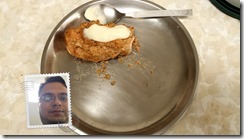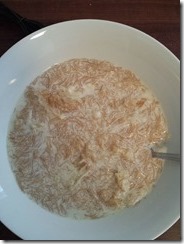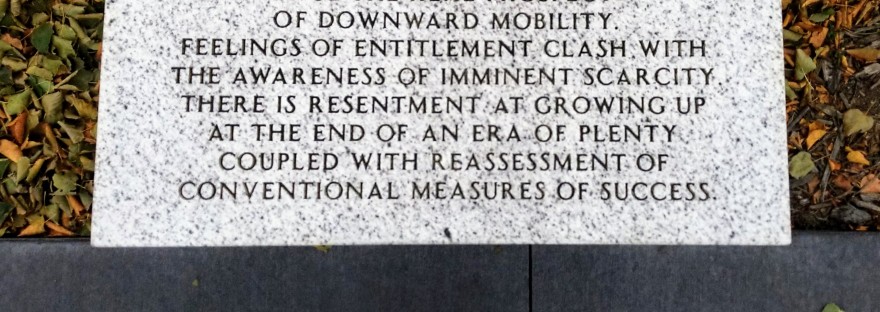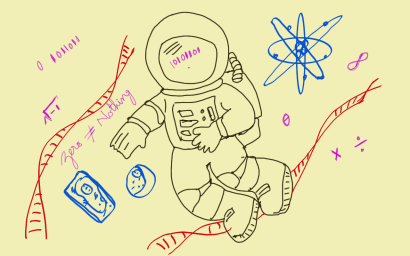You are what you eat is what they say and I am an Indian. Born and brought up in India I was fed only on Indian food or Indianised version of any other food. So, my veins pretty much carry Indian curries and I smell like a spice garden. On September 3, 2013 I left India for Canada. Before this I had never entered a kitchen with an intention to cook or to even attempt to learn to cook. Mothers always worry when their children leave them and my mother’s biggest worry was my food. She would tell people, “this boy cannot even make chai properly.” So, when I landed in Canada I needed two things very badly: a good sleep, and food. Sleep was the easy part and for food, initially I managed to survive on whatever I could buy from cafeteria and food court in my University. But, the concentration of Indian spices in my blood was declining sharply and I was craving for Indian food exactly in a manner a drug addict craves for a shot. Only solution was to cook.
On my first weekend I decided to go for groceries. At this juncture the biggest problem was to decide what to cook. I have eaten hundreds of India food items and I didn’t know to prepare even one. So standing on the aisle of Indian food at the Superstore I was like a thirsty man caught in the middle of an ocean: water everywhere but not a single drop to drink. I perhaps could boil rice, I bought it. I might need condiments and salt, I thought, so I bought them. But, the real craving was for some curry, dal or sabzi. This is where I was stuck. A boy who had never entered kitchen would never know how raw lentils look like. I didn’t even know what they were called. After few minutes of deliberation with myself I picked chicken thighs, and two random lentils.
It was Saturday night and I was about to cook for the first time. When I was at Superstore, I had only one major question-what to cook. Now, when I was about to cook I had an ocean of questions. I had to boil rice. First question, how much rice is required for one person. Second question, how much water is to be added. Third question, for how long does it stay on heat. Finally, when the rice was boiled, last question- who the hell is going to eat it. I had added extra water, overcooked it and had it even remotely looked edible, probably 10 people could have eaten it . That night again I was found at the Subway eating a 6inch. I had not given up though. Laptop is one of my best friends and it came to rescue again.Next day I looked up on YouTube how to prepare lentils that I had bought and I had a decent meal prepared. That was perhaps the most satisfying meal I have ever had in my life. That day I was convinced that internet is the best invention of mankind after wheel and YouTube is a life saver. It has been over a year since then and I have often found myself creating Indian flavours in Canada. Now, I don’t even have to look up recipes on YouTube; I can recall taste and texture of the food I had eaten and can prepare the same thing in my kitchen. I am proud of myself and Indian food. Here are some of the things that I have prepared over the last year. There are lots of videos available on YouTube but I will share the ones that, I found, would give the best results with less effort.

Tandoori chicken. I had bought boneless chicken and this was the first chicken item I looked up on YouTube. This tandoori chicken does not look the way you may find in restaurants but it tastes far better. Had spices to the heart of the piece. http://youtu.be/vCODeJt9gvc This video uses some kind of a Gas tandoor but I baked it in a normal oven.

Chilli chicken. This is one of the most famous Indo-Chinese dishes that you will find in almost all the restaurants in India. It is really simple to cook and tastes amazing. http://youtu.be/77mTZjLhy0o Beware of splattering of oil when you fry chicken.

The bread that you see in this picture is called lachha parantha which I bought from a local Indian groceries store. But, the curry that you see is a chicken item prepared in the way my mom prepares it. You will not find any recipes for this item on internet because this type of chicken is prepared only in a very small pocket of region to which I belong. The recipe, in short, is as follows. We evenly chop onion. You would need as much onion as the weight of your chicken. Also add chopped ginger, finely chopped garlic, cumin seeds, fenugreek seeds, coriander seeds and some whole dry red chillies along with onion. Fry till onion melts into the oil. Flame has to be medium-high. Add lots of evenly chopped tomatoes and cook until they loose all the moisture and oil begins to separate out from the ingredients. At this juncture add red chilly powder, garam masala, salt, turmeric powder, ground pepper. Cook for 5 mins with constant stirring. Add chicken pieces. Cook properly. The preparation at this moment will look like the one in picture and this can be eaten with roti or bread. But, some people like to eat it with rice so add some water and do not forget to season the final product with chopped cilantro leaves.

Palak paneer. This is one of the most famous paneer (cottage cheese) items prepared in a thick and rich sauce of palak (spinach). Tastes best with Naan or plain parantha. http://youtu.be/ZtPDWTAYpoY

Dum aaloo. This I prepared along with a friend and tastes amazing. The gravy is made from yogurt which gives a mild taste along with the hotness of spices added to prepare it.

The star of this plate is Karele ki sabzi. This is the greenish item you see on the plate. It is prepared from bitter gourd/melon. I usually hate this vegetable but the way this guy has made it in the link that I am sharing here is amazing. Do try this. http://youtu.be/vPXg2Ypl9bg

Sewain ki kheer. My aunt makes this and that is best sewain ki kheer I have ever had.

Aaloo ka parantha. If you have ever been to North India then it is impossible that you have missed this guy. Aaloo ka parantha is the star of North Indian breakfast items. I did not see any recipes for this. I imagined the ingredients and came up with this delicious parantha (stuffed bread). To make this first we need to prepare stuffing. Boil some potatoes, mash them, add salt, finely chopped green chilies, finely chopped ginger, finely chopped onion, some garam masala, some ground pepper, some red chilly powder, cumin seeds, coriander seed powder and finely chopped mint leaves. Prepare a homogenous mixture. Now, knead wheat flour into a soft dough. Take big ball of dough and slightly flatten it so as to place the filling mixture in it’s centre. Cover the filling from all sides in the same dough so that you get a ball of dough filled with mixture in its centre. Roll it gently. Cook it on high heat over a pan with gentle patting of oil or butter.
Now I can make paneer (cottage cheese) ka parantha, gobhi (Cauliflower) ka parantha and methi (fenugreek leaves) ka parantha as well. (I am sorry if it sounds a bit of self praise, I am happy that I can feed myself some good stuff)

Kadhai Paneer. Goes great with cocktails.
http://youtu.be/hIm-tqfdal4

Roti. Roti is the most commonly eaten bread in India and I am especially proud of myself that I know how to make it. Ask an Indian and he would tell you how tough it is to make a roti for a novice. The trick starts from preparing wheat dough that is of the right consistency and has been properly kneaded. Then everyone cannot roll this thing into a good round shape. Finally, making the rotis puff is the most tricky part. My rotis puff each time now and this is what makes them soft, healthy and easy to digest. I can not write down the real trick to get soft, puffed rotis because the texture of dough can only be felt. I have taught this to a friend of mine who would jump every time the rotis would puff. Actually even I jump to see my rotis puff. Oh! I am so proud of it.

Vegetable Biryani. It is Diwali today and this is how I treated myself on this day. Here is the video that you can watch to learn this delicious rice item.
http://youtu.be/-WJZv6OU9x0 I am sorry this video does not have English subtitles but they do mention all the steps in English as she cooks.
Now I realise that it is not easy for a mother to cook food for a family. Just deciding what to cook is frustrating and when each family member demands different taste, the task becomes much more difficult. But then moms are the most efficient beings on Earth we all love them. My mom is happy to know that I am eating well. Since the cooking has been sorted out, I need to figure out one important thing – my PhD.
 as not good enough for the real world. So, I invested in skills such as public speaking, academic writing, learning statistical and photography software. I took extra field projects and published more than 11 research articles in reputed international journals. I had served my time, and it was my turn to raise my head and look around where I was. I found myself standing on a raised platform in the middle of recruiters. With all the gold medals and trophies in my hand, I shouted, advertised, tried to sell myself hard. All I needed was one look from someone who would value not my achievements, but the symbolism behind them. Gold, once cast into a medal, does not represent a precious metal from the periodic table, but signifies the honor of its owner. I needed someone to appreciate that, approach me and understand that although I do not have any experience with a real job, I have what it takes to excel in the toughest conditions. A doctorate is not just a certificate of completion of a long research project, but it is a proof of mental determination to achieve excellence, and we need people outside academia to realize this. On the contrary, I found myself at my cousin’s wedding with ‘Dr.’ before my name, avoiding that one question after every customary Congratulation – “so when are you getting a job?”.
as not good enough for the real world. So, I invested in skills such as public speaking, academic writing, learning statistical and photography software. I took extra field projects and published more than 11 research articles in reputed international journals. I had served my time, and it was my turn to raise my head and look around where I was. I found myself standing on a raised platform in the middle of recruiters. With all the gold medals and trophies in my hand, I shouted, advertised, tried to sell myself hard. All I needed was one look from someone who would value not my achievements, but the symbolism behind them. Gold, once cast into a medal, does not represent a precious metal from the periodic table, but signifies the honor of its owner. I needed someone to appreciate that, approach me and understand that although I do not have any experience with a real job, I have what it takes to excel in the toughest conditions. A doctorate is not just a certificate of completion of a long research project, but it is a proof of mental determination to achieve excellence, and we need people outside academia to realize this. On the contrary, I found myself at my cousin’s wedding with ‘Dr.’ before my name, avoiding that one question after every customary Congratulation – “so when are you getting a job?”.
 March for science is a way for the scientists to make themselves heard and perhaps, to make the general public realise that the independence of science is under threat. But, what has happened recently that is so wrong that the scientists had to leave their laboratories and field work to protest on the streets. Why is it that the general public is talking about issues such as terrorism, feminism, LGBTQ rights, freedom of expression but not the independence of science? The reason is that the scientific community has failed to create a face of its own to promote its achievements. Let me explain this further. We all eat food and thank the local grower, farmer, and even acknowledge the agro-companies for nature’s bounty. However, how many times do we, even the scientists, think about the efforts of grad students, science technicians, and principal investigators? I am writing this article on a laptop that has a beautiful 4K touchscreen and is running hundreds of processes in the background, and you are reading this on some kind of an electronic gadget that is equally awesome and far more capable than a typewriter. However, the manufacturers such as Apple, Dell, Samsung have become the face of this technology, and very little thought is given to the engineers working day-and-night to bring to us the technologies that are making our life easier. In fact, everything around us and beyond our sight, from a nano-bead in your face wash to a giant spaceship, has been made possible by the scientific community. I even know some scientists who model the properties of ceramic so that our coffee mugs have better design and strength. When everything around us is a gift of scientific research, then what has happened that scientists are on streets demanding the right to conduct better science without political interference? Probably we all have taken things for granted, and unless the scientists come up with something such as the discovery of gravitational waves, it does not make news headlines. Although, a common person may not even appreciate the importance of the discovery of gravitational waves.
March for science is a way for the scientists to make themselves heard and perhaps, to make the general public realise that the independence of science is under threat. But, what has happened recently that is so wrong that the scientists had to leave their laboratories and field work to protest on the streets. Why is it that the general public is talking about issues such as terrorism, feminism, LGBTQ rights, freedom of expression but not the independence of science? The reason is that the scientific community has failed to create a face of its own to promote its achievements. Let me explain this further. We all eat food and thank the local grower, farmer, and even acknowledge the agro-companies for nature’s bounty. However, how many times do we, even the scientists, think about the efforts of grad students, science technicians, and principal investigators? I am writing this article on a laptop that has a beautiful 4K touchscreen and is running hundreds of processes in the background, and you are reading this on some kind of an electronic gadget that is equally awesome and far more capable than a typewriter. However, the manufacturers such as Apple, Dell, Samsung have become the face of this technology, and very little thought is given to the engineers working day-and-night to bring to us the technologies that are making our life easier. In fact, everything around us and beyond our sight, from a nano-bead in your face wash to a giant spaceship, has been made possible by the scientific community. I even know some scientists who model the properties of ceramic so that our coffee mugs have better design and strength. When everything around us is a gift of scientific research, then what has happened that scientists are on streets demanding the right to conduct better science without political interference? Probably we all have taken things for granted, and unless the scientists come up with something such as the discovery of gravitational waves, it does not make news headlines. Although, a common person may not even appreciate the importance of the discovery of gravitational waves.














 Being awarded a
Being awarded a 